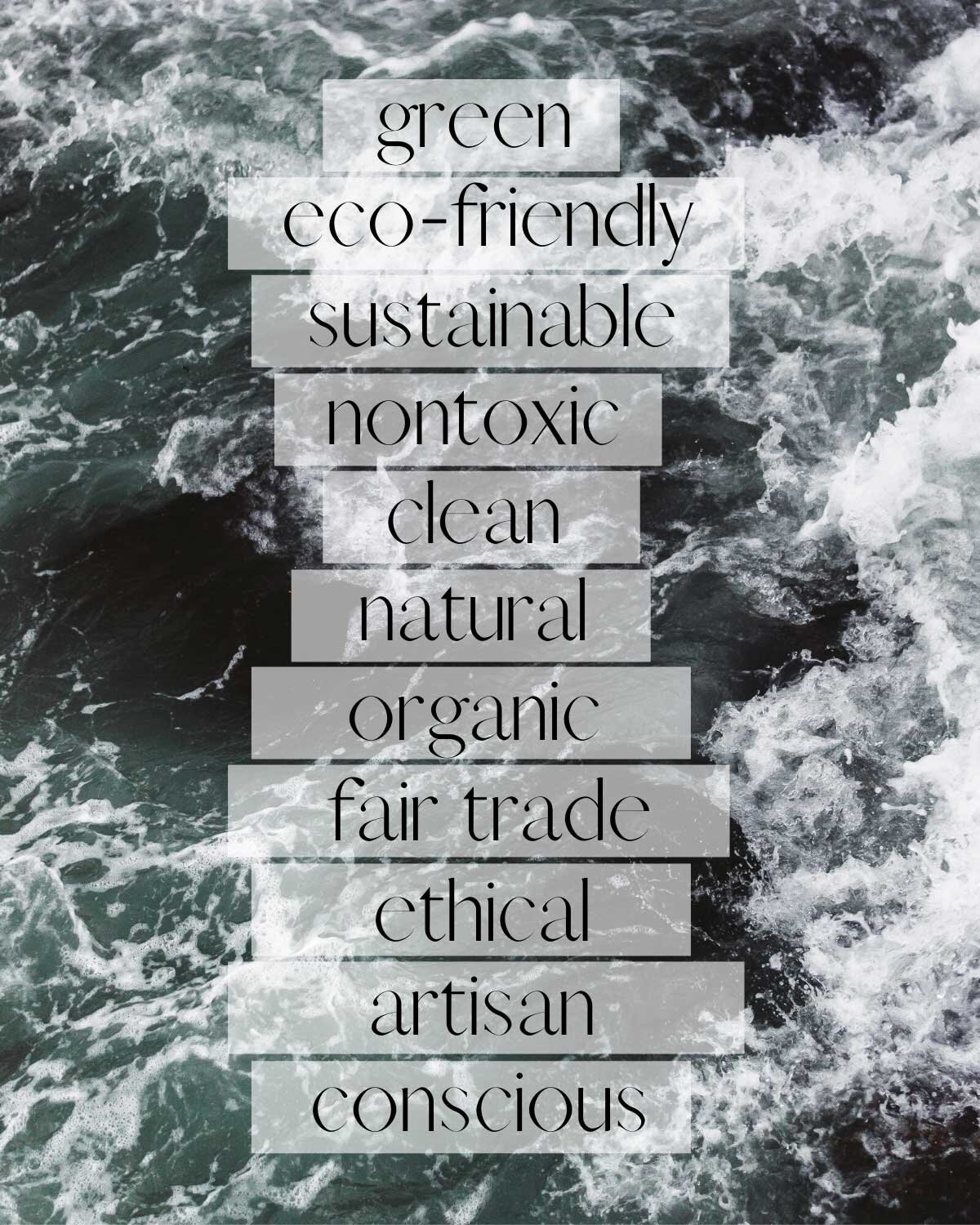Let's Be Clear: Difference Between All The Commonly Used Eco Terms
Words like sustainable, eco-friendly, fair trade, clean... all those eco terms can be eco-nfusing!
It’s easy to use these terms synonymously and loosely, just like you see in marketing and media worldwide. But, since part of the ecobabe initiative is education, I’d like to make sure you’re not greenwashing… yourself.
So, here's a simple guide to the language you can use, as you move through your beautifully conscious life. And yes, conscious is one of these words!
Green vs Eco-Friendly vs Sustainable
Green is a very broad term. From fashion to architecture to certain practices, it can be used to describe ANYTHING that benefits the environment.
Eco-friendly is a little more specific. It means that something won’t harm the environment.
And sustainability is the most specific of all three. To be sustainable, is setting focus on the future — sustainability means that something will not only be harmless to the environment, but it will also allow for long-term environmental quality without depleting the Earth’s natural resources.
So take a hotel that places placards on bathroom vanities, for example. These little cards instruct guests to reuse their hotel-dispersed toiletries. This practice is green, but it’s not eco or sustainable. If the same hotel were to source natural ingredients and recyclable packaging for those toiletries, this practice would be eco-friendly. And if the same hotel were to eliminate those plastic, pollution ridden toiletries altogether, NOW they’d be sustainable.
Non-toxic vs Clean vs Natural vs Organic
These terms usually pertain to beauty. So, non-toxic means exactly what it sounds like: that a product is made with ingredients that are free of toxins.
But clean brings a little more depth — It includes non-toxic. Clean beauty is made with all nontoxic ingredients, natural or synthetic, that are third-party tested and guaranteed to be safe to use, without causing harmful side effects like skin irritation, hormone disruption and/or cancer.
Natural is a little more tricky. This simply infers that all ingredients are derived from sources you’d find in nature.
But organic is a legally defined term (and one that I trust the most), as ingredients are not organic unless certified by the USDA. The USDA verifies that these ingredients are being produced to their standards, free from synthetic chemicals that are harmful to both the environment and to humans.
So, take petroleum for example. You may see a lot of ‘petrolatum’ in beauty products, which is a by-product of petroleum. Either way, both ingredients are natural. They’re made from crude oil, which comes from the Earth. But petroleum is one of the 12 toxic ingredients you should avoid, as it’s a possible carcinogen in humans and a known carcinogen in animals.
My point is that petroleum is not certified organic, nontoxic or clean, yet it is still natural. And do you want a cancerous ingredient, albeit natural, in your skincare? I’m guessing not. This is why the term ‘natural’ can be so tricky.
To make sure you avoid problematic ingredients like petroleum, go here and download my handy chart with the top 12 beauty ingredients to avoid. This way, you can easily refer to it while reading labels and keep those toxic ingredients at bay.
Fair Trade vs Ethical vs Artisan
These terms generally refer to fashion and home goods. And sometimes food.
Fair Trade is a government certification that protects producers of goods in developing countries. It ensures that these workers and farmers have received a fair price, in trade for their products. This certification also typically promotes ethical treatment, sustainable farming practices and the reduction of poverty.
Speaking of ethical, this term refers to the working conditions of those workers. Ethical is not legally certified, but it means that workers have fair job hours, legal rights and fair wages. It also means that laborers are protected health and safety-wise, in their workplace.
Artisan simply refers to how a product is made. Artisan products are handmade and crafted without machines.
This is where your power of purchase really comes into play. Purchasing ethical and fair trade products is essential for the welfare of the world’s people.
Conscious
Last but not least, we have conscious. This is a lifestyle term, meaning it describes an aware consumer with high standards privy to health and wellness and the environment. The conscious consumer reads labels, and is willing to buy a little less to spend a little more on sustainable, fair trade and/or clean products.
You can also use conscious to refer to products, as in ‘conscious goods’. Meaning the product is produced in the most sustainable, ethical, healthiest way possible.
I hope this guides you with less confusion and more confidence in your eco journey. And now, you really know which terms and certifications to look for while curating your own conscious lifestyle — win win! Please drop any questions below. I’m always here for you.
I’m glad we cleared this up X


